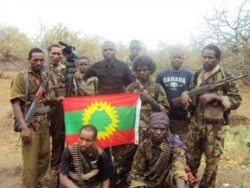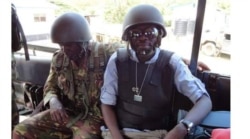The arrest and alleged abuse of a Kenyan journalist working in Ethiopia is renewing scrutiny of press freedoms in the country.
Kenyan journalist Collins Juma Osemo, also known as Yassin Juma, said he was in Ethiopia on assignment for the U.K.-based Sky News as a producer. Juma said his own company, Horn24 Media, also planned to film a documentary for the Oromo Broadcasting Network, an Ethiopian government affiliate in the Oromia region.
In an ordeal that lasted more than two months, Juma was arrested and faced multiple charges, including inciting violence and plotting to kill senior Ethiopian officials. Juma told VOA that he contracted the coronavirus while in a detention center in Addis Ababa. He also said he broke a rib during an altercation with men he believes were security personnel after he was released on bail.
Fekadu Tsega, the director at the Office of the Attorney General, on Thursday disputed Juma’s account and denied that individuals in custody are mistreated, telling VOA, “That’s not how we work.”
In an interview with VOA, while in quarantine as he prepared to return home, Juma said his experience shows the press in Ethiopia continues to face severe restrictions.
“All I can say is that I think maybe the world celebrated a little bit too early on the perceived changes in Ethiopia,” he said.
The Committee to Protect Journalists, an independent journalism advocacy group, reports that in the wake of protests following the June 29 killing of popular Oromo singer Hachalu Hundessa, Ethiopia has shut down the internet and accused some media outlets of inciting violence. The government has ordered investigations into media organizations and arrested a total of 4,700 people, CPJ reported.
For years, rights groups and dissidents have raised concerns about the Ethiopian government’s use of anti-terrorism laws to target journalists. Violent unrest in the country, and concerns about the role of inflammatory news reports and social media posts in stoking violence, contributed to public support for the laws.
“It is of the larger Ethiopian population’s belief that something had to be done,” said Zecharias Zelalem, an Ethiopian journalist who writes about the country. “There had to be [something] done to criminalize some of these really inciting media posts.”
The concern, Zecharias added, is that the government will overreach.
“There is also the well-placed fear that we might go back to what was a very dark era for independent journalism, the pre-2018 era of journalism, which saw legislation used simply to crack down on any Internet, any sort of internal dissent, whether there were bloggers, journalists or just influential social media personalities,” he said.
In an interview from a health center in Addis Ababa, Juma said he was arrested while visiting the home of jailed Oromo opposition leader Jawar Mohammed. Along with several employees of Oromia Media Network, he was detained by federal police and faced charges ranging from blocking a funeral procession to not having the proper accreditation to work as a journalist. He said all the charges were eventually dropped.
Ethiopian prosecutors questioned the documents Juma filed when entering the country.
“It was not clear that he was a journalist at first, as it was written saying ‘IT professional,’” Tsega told a VOA Amharic radio program. “While others were saying he was a journalist, [Juma] himself said he is an IT professional.”
“When there was a search in Jawar’s home, and in connection with what was found in the residence and satellite-related equipment under investigation, he was arrested because he was suspected of assisting with these efforts,” Tsega said. “His profession as a journalist came after the fact, and why he wanted to hide this information himself, he [Juma] only knows the answer.”
The prosecutors also alleged that Juma didn’t get the proper accreditation to operate in the country.
“We also looked into the case when we heard that he is a journalist from media outlets because all foreign journalists have to go through accreditation through us. We found that Yassin Juma is not registered in our records anytime,” the director-general of Ethiopian Broadcasting Authority, Getachew Dinku, said, speaking in Amharic.
However, Juma said he obtained accreditation to work on a documentary from the Ministry of Tourism when he embarked on his project.
“I have the accreditation,” he said. “The government knows I have it. They can check all the Ministry of Tourism. Actually, it’s the Ministry of Tourism that gives accreditation, not any other Ministry, not Information. So, they have it, and the government has it. They can check.”
After he was released on bail in early August and walked out of the Arada Sub City Police Station in Addis Ababa, Juma said he was approached by people who he believes were plainclothes security personnel.
“All of a sudden, six armed men came with a small van and then I started, well, I started protesting,” he said. “I mean, ‘why are they stopping us? We’ve just been freed.’ And then they were stopping us. So, while we were protesting, they started now beating us. One of us was hit on the wall and then, I sustained the broken rib and my back also … We were forced into a vehicle. And they warned us not to protest or do anything or they are able to do anything to us.”
The vehicle drove around the city and the men took Juma and the others back to the police station they had just been released from, and then left them there, the journalist said. He told VOA the police officers looked confused when he was returned.
Juma was moved again to a crowded city jail in Addis Ababa, where he said he contracted the coronavirus.
Tsega, from the Office of the Attorney General, denied security officials were involved in picking Juma up after he was released on bail. “If [Juma] is truly saying that he has been beaten and experienced harassment, let him formally report it,” Tsega said, speaking in Amharic.
He said Juma was kept at the detention center for a couple of days after his bail as a quarantine measure because he tested positive for the coronavirus.
On August 20, following efforts by the Kenyan Ministry of Foreign Affairs, Foreign Correspondents’ Association of East Africa and other international groups, including the Committee to Protect Journalists, Juma was moved to an isolated health facility to recuperate. He said he expects to return to Kenya this week.
This is not the first time Juma has faced pressure from the government. He was accused of working with a rebel group in Ethiopia’s Oromia region a decade ago while working on a documentary about the insurgency in the region.
“Part of me coming back to Ethiopia was to do a documentary of my return to Ethiopia after the perceived changes two years ago,” he said. “After I was banned, I was actually labeled a terrorist 10 years ago.”
While Juma’s ordeal appears to be drawing to a close, questions linger about how existing laws might be used in the future to target journalists.
“We’re just sort of distancing ourselves,” Zecharias said. “The country is still distancing itself from the era of authoritarianism. It is hard to say for certain whether these laws will be implemented with the fairness that Ethiopian people and Ethiopian journalists deserve.”
Horn of Africa Amharic Service’s Meleskachew Amiha contributed to this report from Addis Ababa.






